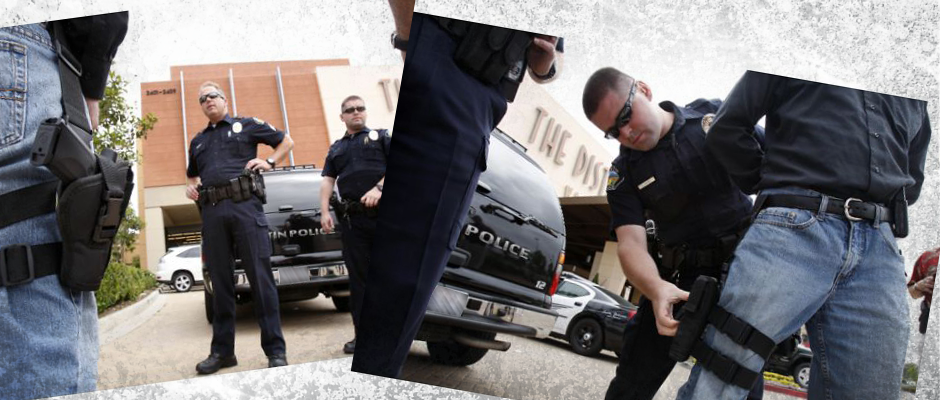Unlawful Detainment or Arrest
What is unlawful anyway? Is it merely perspective? It was shaping up to be a lovely evening. Fit as any for a pleasant stroll around the block. In need of a couple of items, a man decided to walk to his local grocery store. Thanks to the media, the entire nation was on edge over a perceived increase in crime. This man took no chances when it came to his safety, so he decided to carry his firearm on his walk.
Though it shouldn’t matter, let me provide some background on this person. This is a law-abiding citizen. He has done nothing wrong. He has no criminal history. He merely wanted to exercise his Creator-given right to self-protection and not be a victim. However, something goes terribly wrong on this particular walk when an officer who doesn’t understand Constitution Rights sees the gun on his side and decides to stop him.
Here are some things both the officer and the man should be aware of:
To begin with, the Constitution protects citizens from being compelled to incriminate themselves. As noted numerous times, questions from law enforcement are not meant to help the citizenry. Instead, the questions are always used AGAINST them. The man who was stopped will likely be reluctant to answer questions, as he should be. Not because he has anything to hide but because the officer shouldn’t be asking the questions in the first place.
Unless the cop suspects this person of participating in a crime, the cop has no right to ask the man about his unalienable right of self-protection, regardless of whether or not the cop likes it.
Detainment is keeping someone in official custody, typically for questioning about a crime or in politically sensitive situations. This is when a cop asks you questions, and you are NOT allowed to blow him off and keep walking. However, being detained without REAL suspicion of any criminal activity violates Delaware v Prouse (Delaware v. Prouse, 440 U.S. 648), and stopping someone over a legally carried firearm violates U.S. v DeBerry (U.S. v DeBerry, No. 95-2232. Court of Appeals 7th).
In this situation, the officer has broken the law—several of them, to be exact. The gentleman who was on his walk knows this and attempts to tell the officer of this, but the officer refuses to hear it. Because of the man’s perceived tone and reluctance, the officer decides to check out the weapon and demands the I.D. from the man. In doing so, the officer breaks another couple of laws.
Seizure of the weapon for any reason without reasonable suspicion of a crime is a violation of Terry v Ohio (Terry v. Ohio, 392 U.S. 1), and demanding I.D. without reasonable suspicion is a violation of Brown v Texas (Brown v. Texas, 443 U.S. 47).
Of course, most officers would undoubtedly invent reasons for such behaviors as demonstrated throughout the country over and over and over again. But it should be noted that if the person being questioned, detained, I.D.’d harassed, resists communication or forfeiture of the firearm; it does not make them a suspect or even suspicious. Instead, it just makes them knowledgeable, making the officer an annoying inconvenience.
This is in the same line of thought as someone inquiring about your religion without consent to converse. It would be of extreme annoyance and a personal matter that is ultimately not the business of the officer asking the questions.
Of course, most officers are not taught this. So any such resistance to their interrogations would ultimately escalate the situation. Sure, some would argue that the man should comply with the officer, but the retort is, “why shouldn’t the officer just comply with the law he or she is there to enforce?” Regardless, this escalation might result in detainment or even arrest. This is where the situation can become legally lethal on both ends.
Having a firearm is not grounds for arrest: “The carrying of arms in a quiet, peaceable, and orderly manner, concealed on or about the person, is not a breach of the peace. Nor does such an act of itself lead to a breach of the peace.” (Wharton’s Criminal and Civil Procedure, 12th Ed., Vol.2: Judy v. Lashley, 5 W. Va. 628, 41 S.E. 197). The officer’s harassment is also no justification for escalation beyond peaceably and orderly.
Any attempt to arrest on these grounds alone is illegal. “Citizens may resist unlawful arrest to the point of taking an arresting officer’s life if necessary.” Plummer v. State, 136 Ind. 306. The United States Supreme Court upheld this premise in the case: John Bad Elk v. U.S., 177 U.S. 529. The Court stated: “Where the officer is killed in the course of the disorder which naturally accompanies an attempted arrest that is resisted, the law looks with very different eyes upon the transaction, when the officer had the right to make the arrest, from what it does if the officer had no right. What may be murder in the first case might be nothing more than manslaughter in the other, or the facts might show that no offense had been committed.”
“When a person, being without fault, is in a place where he has a right to be, is violently assaulted, he may, without retreating, repel by force, and if, in the reasonable exercise of his right of self-defense, his assailant is killed, he is justified.” Runyan v. State, 57 Ind. 80; Miller v. State, 74 Ind. 1.
“These principles also apply to an officer attempting to make an arrest, who abuses his authority and transcends the bounds thereof by the use of unnecessary force and violence, as they do to a private individual who unlawfully uses such force and violence.” Jones v. State, 26 Tex. App. I; Beaverts v. State, 4 Tex. App. 1 75; Skidmore v. State, 43 Tex. 93, 903.
“An illegal arrest is an assault and battery. The person so attempted to be restrained of his liberty has the same right to use force in defending himself as he would in repelling any other assault and battery.” (State v. Robinson, 145 ME. 77, 72 ATL. 260).
“Each person has the right to resist an unlawful arrest. In such a case, the person attempting the arrest stands in the position of a wrongdoer and may be resisted by the use of force, as in self-defense.” (State v. Mobley, 240 N.C. 476, 83 S.E. 2d 100).
“One may come to the aid of another being unlawfully arrested, just as he may where one is being assaulted, molested, raped or kidnapped. Thus it is not an offense to liberate one from the unlawful custody of an officer, even though he may have submitted to such custody, without resistance.” (Adams v. State, 121 Ga. 16, 48 S.E. 910).
“Story affirmed the right of self-defense by persons held illegally. In his own writings, he had admitted that a situation could arise in which the checks-and-balances principle ceased to work, and the various branches of government concurred in a gross usurpation.’ There would be no usual remedy by changing the law or passing an amendment to the Constitution should the oppressed party be a minority. The story concluded, ‘If there be any remedy at all … it is a remedy never provided for by human institutions.’ That was the ‘ultimate right of all human beings in extreme cases to resist oppression, and to apply force against ruinous injustice.'” (From Mutiny on the Amistad by Howard Jones, Oxford University Press, 1987, an account of the reading of the decision in the case by Justice Joseph Story of the Supreme Court.
The hypothetical situation presented is one of many that could ensue. Of course, many of the court rulings listed above work in more than just firearms-related situations. Citizens and officers need to ask themselves this: would an officer be allowed to stop, detain, I.D., question, or arrest someone for their religion? Of course not! So why or how are we allowing these events to occur over firearms or any other right?
The Supreme Court has upheld that the Second Amendment provides Americans a fundamental Right to bear arms that state and local governments cannot violate. The Right to Bear Arms is enumerated in our Bill of Rights and many other rights. And “[a] bill of rights is what the people are entitled to AGAINST every government on earth, general or particular, and what no just government should refuse.” — Thomas Jefferson December 20, 1787 – This includes both state and local.
It boils down to this: If you swear an oath to uphold and defend something, you need to know what you are supporting and defending. If you are going to exercise your rights, you need to know about those rights.
ignorantia iuris nocet
Learn More
Now, let’s see what an unlawful stop might look like (minus a death and with the addition of trying to destroy evidence).
The following incident involves Mr. Jon Street and a Houston Police Officer… where the Houston officer broke several laws, ignored others, and then attempted to destroy evidence. Then the officer displays even more disregard for the Constitution and those who seek to exercise their rights. After threatening to throw Street in jail for not having an I.D., he is heard telling the protester that he was tired of seeing open-carry “idiots.”
You might also like my article titled “Is Contempt for Law Enforcement Justified?”




